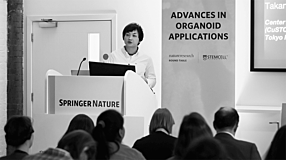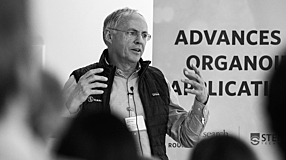Nature Research Round Table: Progress and Challenges in Organoid Models of Human Brain Development
Dr. Madeline Lancaster discusses how brain organoids can be used to model human neurogenesis and neuronal migration, and how her lab has recently cultured brain organoids at the air-liquid interface. Dr. Lancaster is a Group Leader at the Medical Research Council (MRC) Laboratory of Molecular Biology at the University of Cambridge.
This presentation was part of a Round Table series titled “Advances in Organoid Applications”, organized in partnership with Nature Research and held at the Springer Nature headquarters in London, UK in June 2019. There, global organoid experts gathered to discuss the current state of the technology. Core discussions centered around protocol standardization, translation into patient care, nomenclature, and understanding what questions a given organoid culture can and can’t answer.
Dr. Madeline Lancaster discusses how brain organoids can be used to model human neurogenesis and neuronal migration, and how her lab has recently cultured brain organoids at the air-liquid interface. Dr. Lancaster is a Group Leader at the Medical Research Council (MRC) Laboratory of Molecular Biology at the University of Cambridge.
This presentation was part of a Round Table series titled “Advances in Organoid Applications”, organized in partnership with Nature Research and held at the Springer Nature headquarters in London, UK in June 2019. There, global organoid experts gathered to discuss the current state of the technology. Core discussions centered around protocol standardization, translation into patient care, nomenclature, and understanding what questions a given organoid culture can and can’t answer.
Get the full picture by reading a commentary and watching webinars and interviews featuring the Nature Research Round Table presenters.
Publish Date:
February 27, 2020
Request Pricing
Thank you for your interest in this product. Please provide us with your contact information and your local representative will contact you with a customized quote. Where appropriate, they can also assist you with a(n):
Estimated delivery time for your area
Product sample or exclusive offer
In-lab demonstration
By submitting this form, you are providing your consent to STEMCELL Technologies Canada Inc. and its subsidiaries and affiliates (“STEMCELL”) to collect and use your information, and send you newsletters and emails in accordance with our privacy policy. Please contact us with any questions that you may have. You can unsubscribe or change your email preferences at any time.








